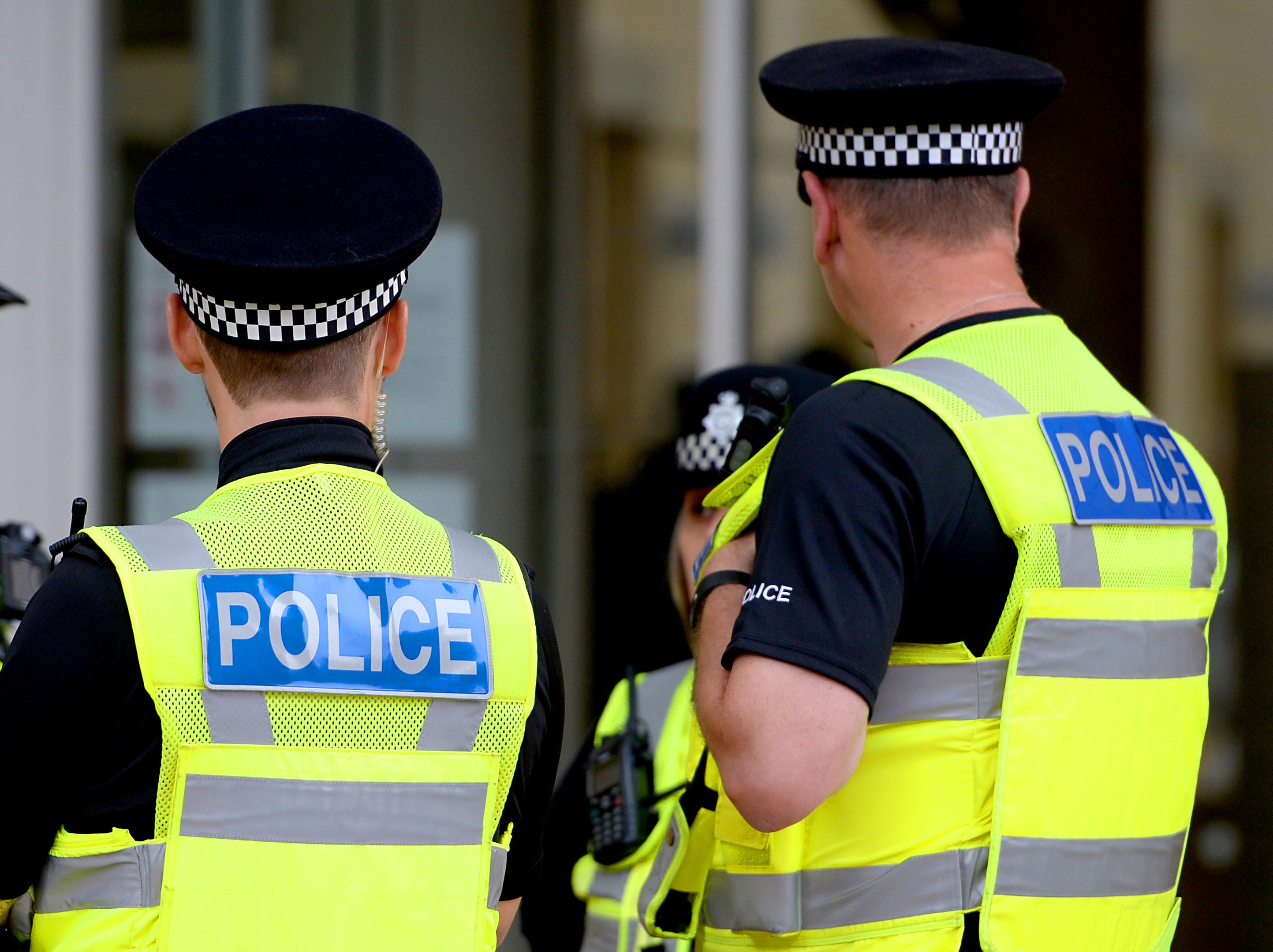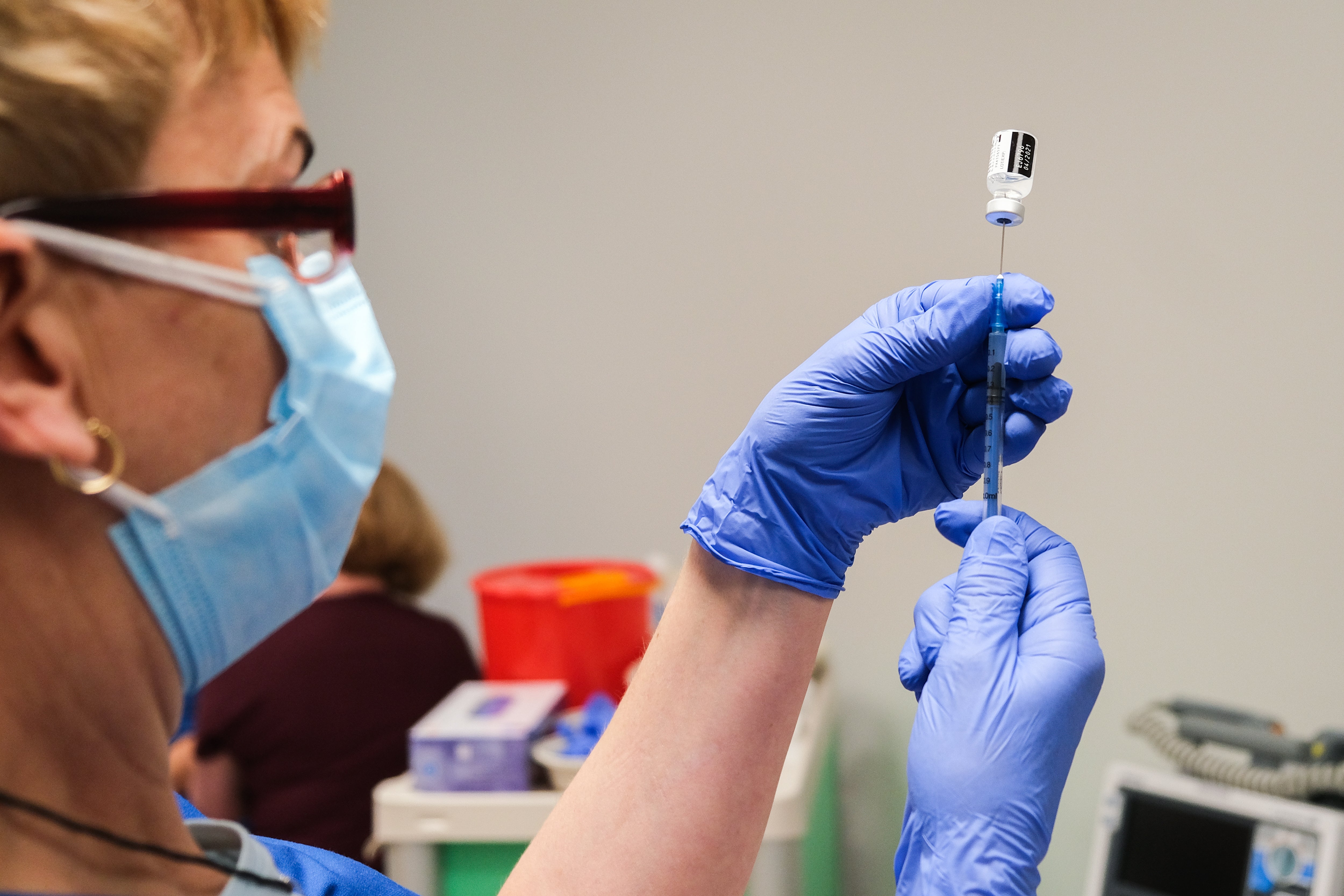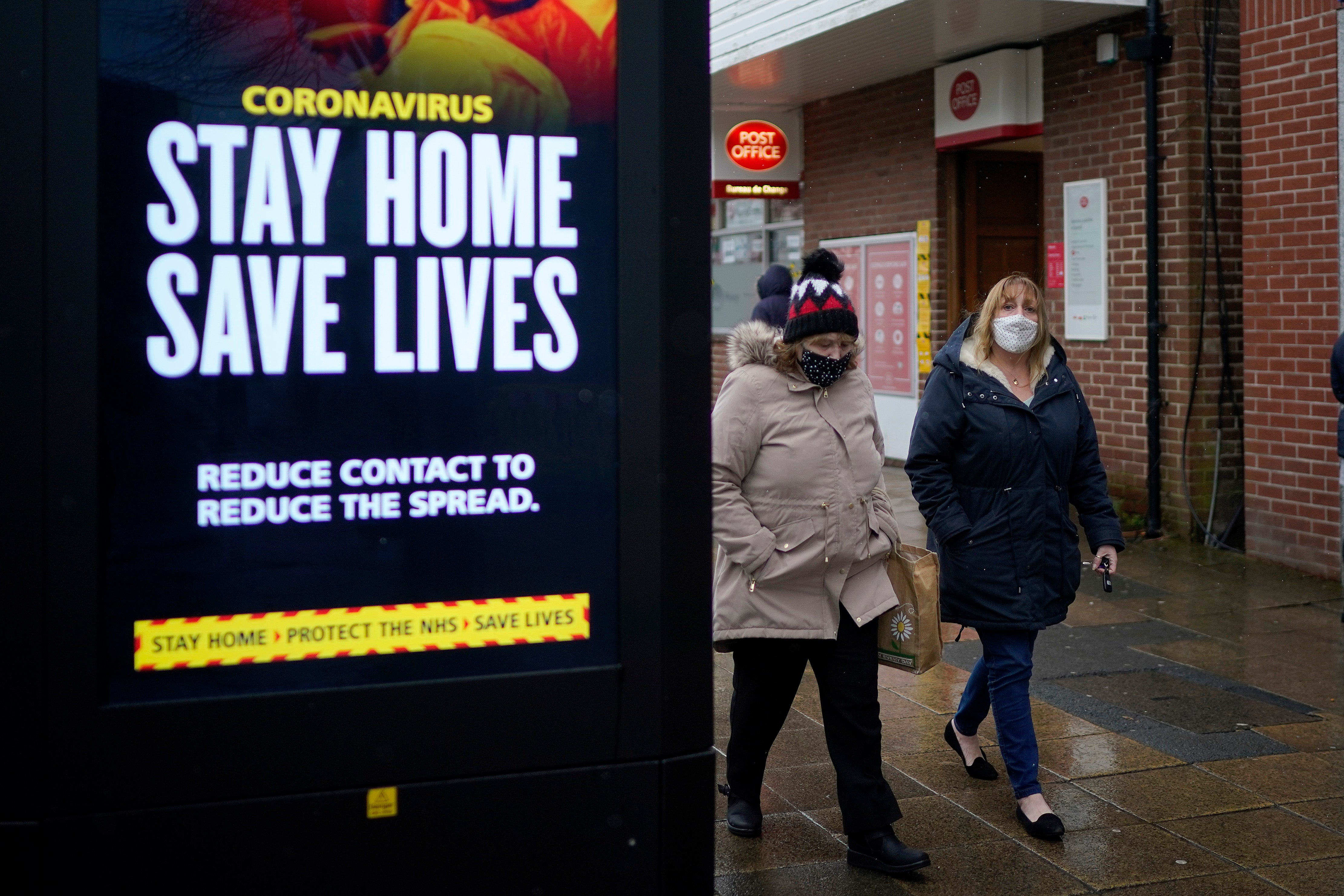Covid news: Johnson hints at tighter border rules and says new variant could be more deadly
Follow for the latest updates

Your support helps us to tell the story
From reproductive rights to climate change to Big Tech, The Independent is on the ground when the story is developing. Whether it's investigating the financials of Elon Musk's pro-Trump PAC or producing our latest documentary, 'The A Word', which shines a light on the American women fighting for reproductive rights, we know how important it is to parse out the facts from the messaging.
At such a critical moment in US history, we need reporters on the ground. Your donation allows us to keep sending journalists to speak to both sides of the story.
The Independent is trusted by Americans across the entire political spectrum. And unlike many other quality news outlets, we choose not to lock Americans out of our reporting and analysis with paywalls. We believe quality journalism should be available to everyone, paid for by those who can afford it.
Your support makes all the difference.Boris Johnson has hinted that the government may have to introduce more border restrictions to stop new variants of Covid-19 from spreading in the UK.
Speaking at a Downing Street press conference on Friday afternoon, the prime minister warned “we may have to go further”.
It comes amid warnings that a new variant of the virus from South Africa could be more resistant to existing vaccines and also more virulent.
Mr Johnson said briefing the most common variant spreading in the UK appears to be more deadly than the original virus.
There is evidence that it “may be associated with a higher degree of mortality” among those infected, he told the briefing.
It is believed that scientists have found 1.3-fold increased risk of death compared with the old variant of coronavirus.
Sir Patrick Vallance, the UK’s chief scientific adviser, said: “Instead of ten in every 1,000 people in their 60s with Covid passing away, 13 or 14 people “might be expected to die.”
Herd immunity through vaccination near impossible, scientists warn as they ask everyone to get the jab
People must not rely on their neighbours being vaccinated to protect themselves from the coronavirus, scientists have warned as they underlined that herd immunity will not be “pretty much impossible” through vaccination or natural infection as the new UK variant is too transmissible.
Prof Paul Hunter from the University of East Anglia (UEA) told Radio 4's Today programme that while the jabs will life to return to near-normal for large parts of society, those who refuse get vaccinated will not be protected by herd immunity.
Prof Hunter said: "If you are uncertain about whether you want the vaccine or not - and especially if you're a vulnerable person - you cannot rely on the fact that your neighbours have been vaccinated, so please, please, please make sure you go and be vaccinated yourself."
He said that going into next winter, those who have not been inoculated will be at risk from coronavirus, and so the UK must ensure “we have appropriate tracking and tracing systems in place so that we identify where local outbreaks are occurring early enough to stop them.”
A UEA study initially found that 69 per cent of the population would need to be given the Pfizer jab, or 93 per cent the Oxford vaccine, to bring the R number below 1.
However, when the new UK variant was accounted for, the modelling showed that these rates only brought the R number to 1.3. The Pfizer vaccine would require 82 per cent of the population to be vaccinated to control the spread of the new variant.
Prof Alastair Grant, also from the UEA, said the combination of "relatively low headline efficacy and limited effect on asymptomatic infections" means the Oxford vaccine "cannot take us to herd immunity, even if the whole population is immunised".
He said: "For this reason, we recommend that health and social care workers, and others who have lots of contacts with those vulnerable to infection, should receive one of the mRNA vaccines in preference.
"The Oxford vaccine will no doubt be an important control intervention, but unless changes to the dose regime can increase its efficacy, it is unlikely to fully control the virus or take the UK population to herd immunity."
Northern Ireland records highest weekly death toll
Northern Ireland has registered its highest weekly death toll since the coronavirus pandemic began, with 156 fatalities recorded in the seven days up to 15 January.
The Northern Ireland Statistics and Research Agency (Nisra) said in a statement: “Two days, the 11 and 7 January 2021, saw the joint highest number of Covid-19 related deaths occurring in any one day since the start of the pandemic. The total number of Covid-19 related deaths that occurred up to 15 January has now reached 2,186.”
The agency confirmed: "Latest figures published today by Nisra show that 156 deaths involving Covid-19 occurred in the week 9 to 15 January 2021, the highest weekly number since the pandemic began."
Police break up wedding with 400 guests in north London school
A wedding attended by some 400 guests in a school in north London was broken up by police last night, with the organiser facing a £10,000 fine.
The windows of the building in Egerton Road, Stamford Hill, had been covered to stop people looking in to the school where around 400 people had gathered for a wedding in breach of Covid-19 regulations, the Metropolitan Police said.
Many of the attendees ran away as officers arrived but the force said the organiser will be reported for consideration of a £10,000 fine, while five others were handed £200 fixed penalty notices.
Detective Chief Superintendent Marcus Barnett said: "This was a completely unacceptable breach of the law, which is very clearly in place to save lives and protect the NHS. An NHS that is under considerable pressure at a time when Covid-19 has killed nearly 100,000 people.
"This is a deadly and very dangerous disease. We can all see that and we must act responsibly. "People across the country are making sacrifices by cancelling or postponing weddings and other celebrations and there is no excuse for this type of behaviour.
He added that officers will “not hesitate to take enforcement action if that is required to keep people safe”.

Police break up wedding with 400 guests in East London
As well as the £10,000 fine to the organiser, five £200 fixed penalty notices were also given to individuals at the scene.
Poland announces it may take legal action over Pfizer Covid vaccine delay
Poland could take legal action against Pfizer next month if the US drugmaker does not deliver all scheduled doses of its Covid-19 vaccine, a government spokesman said on Friday.
Pfizer, which developed the vaccine with its German partner BioNTech, has reduced the volume of the vaccine it will deliver to European Union countries this week.
Pfizer and BioNTech have declined to comment on the cuts beyond a statement last week which announced cuts to deliveries as they ramp up manufacturing in Europe.
Read Pawel Florkiewicz’s report here:

Poland announces it may take legal action over Pfizer Covid vaccine delay
Italy has also said it will consider taking legal action
Highest proportion of adults ‘staying at home’ since May 2020, ONS survey finds
The proportion of adults who said they stayed at home or only left for limited reasons such as work or exercise has reached its highest level since May 2020, the Office for National Statistics’ weekly survey has found.
More than six in ten adults (65 per cent) reported staying at home or only leaving for work, exercise, essential shopping or medical needs in the past seven days; the highest proportion reporting this since May 2020.
The statistics agency also found that the proportion of employed adults that have worked remotely was at its highest since June 2020, with 45 per cent reporting having done so this week compared with 43 per cent last week.
Meanwhile, compliance with most measures to stop the spread of the coronavirus remained at high levels. The same percentage as last week reported ‘always’ or 'often’ washing their hands after returning home (90 per cent), wearing a face mask (96 per cent) and avoiding physical contact when outside their home (93 per cent).
Over 450 Scottish care homes investigated over Covid-related deaths
More than 450 care homes in Scotland are under investigation over deaths linked to the coronavirus.
The Crown Office and Procurator Fiscal Service's dedicated Covid-19 Death Investigation Team (CDIT) is probing the circumstances of coronavirus-related deaths in 474 care homes.
The team had received 3,385 death reports as of Thursday, with a majority of those believed to be linked to people who lived in care homes. The figure includes retrospective reports, a spokesman for the Crown Office told PA media.
Donald Macaskill, chief executive of Scottish Care, which represents the care home sector, said the investigations are "wholly disproportionate", telling the BBC that the probes “are causing irreparable damage to the professional integrity of nurses and carers who are exhausted beyond measure in fighting the virus”.
Black and Asian Covid patients dying disproportionately, study finds
Black and Asian ethnicity patients more likely to die prematurely of Covid, a large cohort study has found.
The research, published in the journal BMJ Open, is based on more than 1,700 patients admitted to five acute hospitals within Barts Health NHS Trust between 1 January and 13 May 2020.
After adjusting for factors like age, sex, obesity, smoking and frailty, the study found that, compared with those from white backgrounds, Asian patients were 1.49 times, and black patients 1.3 times, more likely to die from Covid-19.
The researchers also found that patients from minority ethnic backgrounds were younger and less frail, compared with white patients. Black and Asian ethnicity patients had median ages of 64 and 59 respectively, compared with 73 in the white group, the researchers said.
It also showed that black patients were 1.8 times, and Asian patients 1.54 times, more likely to be admitted to an intensive care unit (ICU) and need mechanical ventilation.
The cohort was made up of 538 (31 per cent) Asian patients, 340 (20 per cent) black patients, and 707 (40 per cent) white patients.
Fifteen residents died in recent weeks at care home in Worcester
Fifteen residents at a care home in Worcester have died after testing positive for the coronavirus.
Bosses at Perry Manor nursing home said they were "saddened by the losses" which came "in recent weeks", after having managed to keep coronavirus out of the facility "until last month".
The facility, which has capacity for up to 82 people, was rated outstanding in its most recent independent inspection - the highest possible grading. Care UK, which runs the home, said it had plenty of PPE, all necessary sanitation equipment, and stuff were trained in their use.
The home's bosses said 33 members of staff had been infected in total, but none became seriously ill. Most were asymptomatic and had since returned to work after quarantining.
Care UK said more than half of staff have now had the Covid-19 vaccine, as well as "all those residents who were well and have not returned a positive test".
Scottish coastguards help to deliver Covid tests
Coastguard Rescue Teams in Barra, Lochboisdale, Stornoway and Harris have been praised for using coastguard drivers and vehicles to help transport completed Covid tests.
The 140 mile trip to a laboratory in Lewis involves two ferry trips and teams have been working in relay to get tests to the facility.
Both Barra and island of Vatersay have been put into lockdown following an outbreak of more than 40 positive cases of virus.
NHS Western Isles Chief Executive, Gordon Jamieson, said: “Coastguard teams have been invaluable in the Western Isles’ response to Covid-19"
More than one million people in England had coronavirus last week, according to ONS study
More than one million people in England are estimated to have had Covid-19 last week, new figures show.
One in 55 people were infected with the disease between 10 and 16 January, according to the Office for National Statistics, the equivalent of 1.02 million people - or 1.88 per cent of the population.
Samuel Lovett reports:

More than one million people in England had coronavirus last week, according to ONS study
One in 55 people infected with Covid-19 between 10 and 16 January, ONS estimates suggest
Join our commenting forum
Join thought-provoking conversations, follow other Independent readers and see their replies
Comments